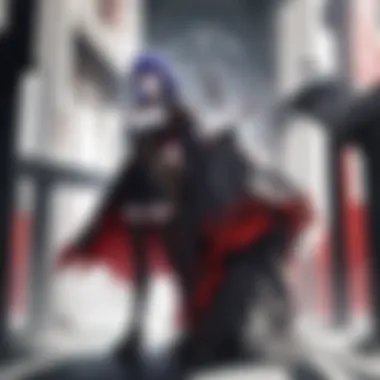Exploring Overlord: The Impact of Funimation's English Dub


Intro
Prelude to the Series
Overlord is an anime series adapted from a light novel written by Kugane Maruyama. The series falls in the dark fantasy and isekai genres. It first aired in July 2015. The story follows a player of a popular online game called Yggdrasil who finds himself trapped in the game as his character, Ainz Ooal Gown. This series blends intricate character arcs with a compelling plot, exploring themes of power, morality, and the chess-like struggles between various factions.
From the beginning, Overlord captivated audiences with its unique premise and high production values. The world-building is extensive, drawing viewers deep into the lore of the game. Since its release, it has maintained a high level of popularity, with a dedicated fanbase touting its engaging plots and complex characters. The reception has generally been positive, particularly noting the depth of the narrative and the characterization presented throughout its seasons.
Staff and Cast Details
The anime was produced by Madhouse and directed by Naoyuki Ito. His skills in developing suspenseful storytelling truly shine in this series. The series composition was handled by Yukie Nagai, who meticulously adapted the original text into the screenplay suitable for animation.
The voice cast for the English dub by Funimation features several talented actors:
- Ainz Ooal Gown: Played by Chris Sabat, Sabat has a range of experience, especially in portraying powerful characters.
- Albedo: The character flows through Caitlin Glass, whose work adds captivating depth.
- Shalltear Bloodfallen: Played by Jill Harris, she infuses an essential blend of grace and danger.
Behind the scenes, the production team displayed a meticulous approach, ensuring that even the minutiae were attended to, enhancing the overall storytelling experience.
Theme Music Analysis
Each season of Overlord includes distinct opening and ending theme songs that resonate with the show's dark themes. The opening song of the first season,
Preamble to Overlord
The discussion of Overlord serves as a fundamental backbone for this article. It provides insight into not only the narrative and character intricacies but also the interplay of this story with the medium of English dubbing. Understanding Overlord helps scrutinize the artistry behind dubbing and localization efforts by Funimation. The nuances within the new audible layer brought by the subtitled translation offer a rich ground for dissection and appreciation for fans.
Concept and Genre
Overlord is attributed to the isekai genre, presenting a compelling mashup of fantasy, action, and adventure genres. The very idea of isekai revolves around characters transported to alternative worlds, often lends itself to innovative, otherworldly experiences. The sensibilities of gaming culture are woven into the narrative fabric; where a player becomes a powerful character within epic quests, exploring themes of identity, power dynamics, and moral ambiguity.
The anime introduces viewers to a world that combines clever world-building with intricate political plots. This variation attracts viewers looking for complex storytelling, departing from standard fare often found in generic isekai entries where characters may lack depth or motivations.
Overview of the Storyline
The storyline of Overlord begins with Momonga, a character entangled in a virtual MMORPG. When the servers are set to shut down, he decides to remain within the game. Surprised and intrigued, he wakes up as his character, Ainz Ooal Gown, in a fleshed-out universe that exists beyond the game code. The engagement shifts as Momonga is in a problematic situation with ravelled reality among NPCs, now able to think independently.
This twist serves a dual purpose—an examination of leadership and an exploration of morality within virtual settings. As Ainz tries to navigate this new reality, he must command his treat inhabitants while confronting factions and entities set on knowing his goals. This provides a narrative variance, one where questions about control over others juxtapose with personal quests of loyalty and discrimination in responsibilities.
In understanding the foundations of Overlord, dive into a tale where drama and spectacle intermingle with strategic thinking, fulfilling for fans eager for substance beneath surface realities. This storyline deeply informs the dub's accuracy and impact, creating sweeping ripples into directorial choices and voice performances that will be analyzed in future sections.
The English Dub: An Overview
The English dub of Overlord holds considerable importance in understanding the narrative and cultural impact of the series. Dubbing facilitates access to the storyline for a wider audience who may not speak Japanese or prefer to engage with the show in their native language. It is a means by which the emotional tone, character interactions, and intricate world-building can be appreciated fully. Through dubbing, the immersive experience of Overlord can reach diverse viewers, fostering a larger community.
While some fans argue for the original Japanese voice performances, dubs present an alternative access point to the anime for audiences who could be discouraged by reading subtitles while simultaneously trying to follow the action on screen. The work that goes into selecting appropriate voice actors and ensuring accurate translations strengthens the narrative cohesion of adaptations like Overlord.
In this overview, we will explore key facets related to the English dubbing of Overlord. This includes insights into Funimation, the premier production house, and considerations around the role of English dubbing in the anime industry.
Prologue to Funimation


Funimation is a leading name in the realm of anime distribution. Founded in 1994, it has built a reputation for delivering high-quality translations and adaptations of renowned Japanese anime. Its efforts are particularly evident in series like Overlord, where it not only handles the dubbing process but also works on promotion, distribution, and even merchandise marketing.
Funimation's experienced team collaborates closely with directors and voice actors to create an authentic representation of the source material. Advances in technology also allow easier reaching of international audiences. Thus, Funimation's influence extends beyond adaptations and impacts insights into broader trends in anime consumption.
A distinctive feature of Funimation is its dual-approach strategy that enables viewers to choose either the dubbed or subtitled versions, catering to different preferences while also showcasing the unique talents of its English voice actors.
Role of English Dubbing in Anime
The role of English dubbing in anime is pivotal for several reasons. Firstly, it serves to reduce barriers posed by language differences. By translating and localizing the original Japanese dialogue into English, new audiences gain insights into storylines, characters, and themes without significant disruption from subtitle-reading.
Secondly, it enhances the emotional resonance of characters and scenes. A skilled voice actor can convey nuances that result in more meaningful portrayals. This is especially relevant in a show as complex as Overlord, where character motivations and interpersonal dynamics drive the plot.
In essence, English dubbing acknowledges the cultural intricacies of the original content while making it appealing and relatable to western audiences. Factors like cultural terminology may require localization, which entails striking a balance between staying true to the original and making adaptations suitable for the target demographic.
Localizing humor, idioms, or references forms a part of this process, always provoking debate among fans about preserving the integrity of the source material versus adaptation for western sensibilities. These elements ultimately affect the quality and perception of the dubbed version, rendering the role of English dubbing both essential and complex in the enjoyment of anime like Overlord.
Character Voices and Performances
The selection of character voices is a fundamental aspect of anime. In this context, the English dub of Overlord provides a fascinating lens through which to explore character interpretation and emotional resonance. With the core essence of the characters pronounced through these voices, it becomes critical to understand the intricacies behind the choices made in the English adaptation produced by Funimation.
Main Characters in Overlord
The anime Overlord features a roster of complex characters. Ainz Ooal Gown stands at the forefront as the series' protagonist. His character, an overwhelmingly powerful being, simmers with intellect and strategic acumen. The voice actor, Adam McArthur, imbues Ainz with a sense of calm authority contrasted against moments of genuine vulnerability, marking unique shifts in personality through vocal nuance.
Other significant characters include Albedo, played bynas Aadee Saxton, whose passionate yet rule-bound demeanor brings immense depth to her loyalty. Then, we must also consider Shera Teiral joined by voice actress, who also captures her contrasting innocence and power effectively. Each character's delineation depends not only on their traits but also on how the voice actors channel them through their performances.
Voice Actors and Their Impact
Voice actors embody their characters, offering them life through dialogue and emotion. The impact of these choices influences how viewers connect to the narrative.
The cast performs with an understanding of their character arcs which is invaluable. For instance, when voices are juxtaposed with scenes of peril or triumph, their emotive delivery participates actively in storytelling. Joel McDonald as Shalltear Bloodfallen infuses ferocity and feral instincts into Normal moments. McDonald’s ability to portray layered fear and resolution renders the character’s backing story compelling and more engaging.
The relationship between voice actors and their characters can shape audience reception. A well-cast role can elevate an average script to capturing sentiments in a resonating manner. Thus, the selection of voice cast remains a powerful factor in character creation.
Character Development in the Dub
The voice dub in Overlord profoundly affects character development, as delivery often goes hand in hand with character evolution. As characters face challenges, how their directors guide the voice performers increases the depth at which the journey is encapsulated.
Listeners can perceive the transformations of Ainz in the English dub through the various tonal shifts that convey authority, hesitancy, and loneliness alike. Little details, such as nuanced pauses or shifts in voice pitch, work together to provide insight into experiences and personal challenges that characters undergo.
The dubbing improved the relationship viewers form with characters. For example, difficult choice points radiate stronger emotions alongside effective voice interpretations.
As we can see with Albedo's rendition, with strong anger juxtaposed against tenderness, the profound fear of losing power entangled in loyalty provides layers to what sometimes become flat moments.
“Voice performances can deeply enhance and evolve character perceptions within dubs, providing benchmarks for significant moments…”
Attention to these details in character voices and performances in Overlord does lots in being available for viewers globally. It creates shared experiences and allows community discussions to burgeon as narratives straddle across cultures.
Production Aspects of the English Dub


Understanding the production aspects of the English dub is crucial in appreciating how Overlord reaches a broader audience. The choices made during production can significantly influence viewer perception and enjoyment. It is not just about translating voices; it involves creating an immersive audio experience that respects the source material while also appealing to local viewers. These aspects include directorial choices, script adaptation techniques, and audio mixing quality.
Directorial Choices
Directorial choices weigh heavily in how an anime series like Overlord is received by English-speaking audiences. The director's vision laps everything from casting to tone. Choosing the right voice actors for characters plays a critical role. This isn't merely about finding actors who can speak English; it is about finding those who can embody the essence of their characters. For instance, when Zach Aguilar voiced the protagonist Ainz Ooal Gown, his performance generated new dimensions to the character. The director steers this ship, ensuring that the final product aligns as close to the original intent while also resonating with Western sensibilities.
Moreover, the directorial approach can dictate how closely the character interactions follow the original script. Observations from how expressions and inflections from voice actors affect audience engagement are seen in many examples. The director's ability to make effective adjustments during the sessions can impact the series' overall fluidity and coherence, making genuinely thoughtful input essential throughout the workflow.
Script Adaptation Techniques
Translation is often perceived as mere word substitution; nonetheless, script adaptation for the dub entails much more depth. It bridges two languages and two cultures, raising questions about nuances, context, and humor. A literal approach risks losing the soul of original content. Adapting characters' dialogues in Overlord captures idiomatic speech and cultural references without diluting memeory or aesthetic experience.
Variations and elongations are crafted to provide English audiences an experience that respects the essence of scenes. Ensuring that humor in the original rock is not lost requires careful consideration of societal and cultural understanding of jokes. Incorporating continually relevant cultural references or phrases ensures fields engagement and retains character voice integrity that fans recognize.)
On well-done scripts, dialogues can evolve that can provide new interpretations but still mirror original essence, leading to a heartfelt resonance with the unapologetic personas drawn in the animated version.
Audio Quality and Mixing
Audio quality is a fundamental aspect that can make or break the entire viewing experience. In the Overlord English dub, high production standards have raised the stakes. Clean coversation, balanced music scores, and distinct sound effects add layers rather than distractions. Using state-of-the-art equipment helps ensure that voice actors sound natural and engaging.
Mixing the different sound elements, including voice, music and foley effects is equally important. Each segment in an anime episode demands careful synchronization to capture the dramatic moments authentically. Dynamic soundscapes maintain immersion in a fantasy such as Overlord, attracting audience connect through an encapsulated viewing round.
Attention to detail in ensuring dialogue is clean, distinct, and not overpowered by background factors proves essential. Researchers find that engagement level closely correlates with quality, making this art form integral for fuelling continued interest.
Cultural Implications and Localization
The English dub of Overlord by Funimation reaches beyond mere translation. It is an endeavor laden with cultural implications and substantial localization challenges. Understanding these components helps to visualize how the anime interacts with different cultures and strengthens its global reach. Localization takes into account not only the words spoken but also the cultural nuances, humor, and social norms of both the source material and the target audience. The end result must appeal to viewers while retaining fundamental elements of the anime's original message.
Challenges in Localization
Localization succeeds through an intricate dance of challenges. One key issue arises in translating abbreviations and idioms. These often fall flat or lose significance in another language. For example, words in Japanese convey sentiments or cultural context that can’t always be duplicated in English.
Additionally, cultural references may confuse fans unfamiliar with certain themes prevalent in Japanese media. Some jokes tied to Japanese pop culture or traditions risk becoming lost in translation, reducing emotional impact and audience engagement. A tailored and mindful approach helps retain the story’s essence—uncovering some roots while adapting what lies above.
Challenges also tackle more than language transformations. Overlord features complex character interactions. The subtleties of power dynamics or social hierarchy can differ widely across cultures. Localizing this content means striking a balance between accountable representation and relatability. Creators must ask: How to showcase character motivations without breach cultural expectations? Therefore, consideration of regional sensitivities is imperative.
Balancing Faithfulness and Accessibility
For the English dub of Overlord, balancing faithfulness to the source material while embracing accessibility unfolds as a key guideline that defines the localization process. Faithfulness intends to reflect the original anime’s themes, metaphors, and narrative structure.
Accessibility, conversely, speaks to how well an audience can relate to and appreciate the work—this might include clarity in dialogue or suitable imagery. A successful adaptation - heaven can not be approached alongside isolation - engages attention, rending the narrative captivating because alienating viewers doesn’t serve longevity in entertainment.
In this regard, creators constantly monitor audience feedback. They gauge whether its subtleties foster connection or elicit confusion, impacting viewer immersion. By ensuring Overlord not only tells its story but also engages viewers actively through gaming enthusiasm and translation sub-text, it stands tall representing its multifaceted nature.
Distribution channels like reddit.com and facebook.com shift conversation further, allowing fans to discuss and criticize the dub grounded in its cultural sense versus original tradition.
Ultimately, striking this equilibrium creates a rendition which fuels excitement while permitting resonance within the vast anime community. This procession guarantees that audiences enjoy comprehensive stories crafted with sentiment and dexterity.
Audience Reception and Critique


Understanding the audience reception and critique of the English dub of Overlord is crucial. It sheds light on the impact of voice acting on crafted narratives and character representations. This discourse simplifies the viewers' response and better informs future productions. Anime fans often express their opinions vehemently, offering critiques that extend beyond personal preference and into the realm of artistic perception. These dialogues not only foster community but also highlight the evolving nature of dubbing practices as influenced by viewer expectations.
Fan Reactions to the Dub
The fan responses to the English dub stand as one of the cornerstones of the dub's reception. Fans typically display a mixture of enthusiasm and criticism, influenced by their original experience of the show in its subtitled form. The serious tone underpinning the narrative of Overlord has necessitated mature performances from voice actors.
Some fans appreciate the English dub for bringing a new dimension to the characters they admire. They argue that certain performances grant fresh insights into character motivations and development.
Conversely, critiques often surface about various voice adaptations. For example:
- Fans compare specific scenes from the Japanese version to identify variations in emotional impact.
- Discontent may arise over unnatural accents or language that feels inconsistent with the characters' origins.
- Disparity in diction can become points of contention that generate considerable discourse in fan communities.
Critique of Voice Acting Quality
The quality of voice acting serves as a focal point in critiques of the English dub. Many fans assert that immersing oneself into the Overlord universe requires authenticity that aligns voice performances with character personalities. The evaluator's attention rests heavily on notable roles, leading to unique discussions surrounding performance quality and delivery.
Several factors regularly enter discussions regarding voice acting:
- Character Alignment: Do the voices closely fit the essence of the animated characters?
- Emotional Delivery: Does the performance elicit feelings parallel to that emanating from the animation and story?
Discussions surrounding individual voice actors often anchor in both commendations and issues identified by the audience. Enthusiastic exchanges may arise relating to specific moments where the impact of voice acting strikes a powerful chord within the narrative arc.
Comparative Analysis: Sub vs.
Dub
Engaging in a comparative analysis of the Japanese sub and English dub is particularly enlightening. This ongoing debate extends around fundamental elements such as faithfulness, cultural nuances, and delivery styles. Fans often form preferences based on how well each format captures the authenticity of themes and character portrayals.
Key points to address include:
- Translation Integrity: English subtitles often strive for accuracy, while dubbed versions may adapt language to suit local expectations. This can mean losing certain subtleties otherwise present in spoken dialogue.
- Audience Accessibility: Dubs primarily cater to English-speaking viewers. This broadens the reach but sometimes leads to the dilution of culturally specific jokes or references.
- Viewer Experience: Each format provides a different experience. Subtitles force viewers to multitask, diving into both screen contents and reading. The dub, however, can create a more immediate engagement.
Ultimately, whether a viewer prefers the sub or dub boils down to their individual taste and viewing purpose.
With ongoing discussions within fan communities, critiques of the dub resonate deeply as Overlord continues to evolve within an extensive landscape of anime.
End
The conclusion of our exploration into the English dub of Overlord is not just a final remark, but a synthesis of the insights we’ve uncovered. This analysis highlights the notable role the English dubbing plays within the broader context of anime localization. Consistently, dub adaptations face the challenge of preserving emotional and narrative fidelity, which enriches viewer engagement.
Legacy of Overlord in the Anime Community
Overlord has carved out a unique position in the anime community. Its blend of fantasy elements and complex character dynamics creates a narrative that resonates with many fans. The English dub produced by Funimation has made this series more accessible. This adaption has brought the content not just to avid viewers of raw subtitles but to those who prefer English dubbing. The voice actors’ performances have received varied responses, yet an overarching consensus is that they contributed significantly to the series' themes of power, isolation, and ambition.
Furthermore, the legacy of Overlord transcends just fandom appreciation. It has sparked discussions about morality within fantasy narratives. The community continues to debate the decisions made by both the characters and their portrayals. This series has placed a spotlight on the traditional anime border between heroes and villains and blurred those lines. Additionally, Overlord has inspired many derivative works, fan art, and fan fiction, reinforcing its impact beyond the screen.
Future of English Dubs in Anime
Looking ahead, the future of English dubs in anime appears promising. As global audiences continue to expand, the demand for high-quality localization increases. Changes rooted in technology influence how dubs are produced. For instance, better mixing and recording techniques can enhance audio quality. Growth in platforms like Funimation and Crunchyroll shows that companies prioritize diversifying their offerings.
Adaptation strategies are becoming more refined as divisions within localization teams grow. They'll likely establish closer relationships with original creators. Understanding cultural tones will facilitate better translations. Fans increasingly rely on dubs. On the one hand, purists will argue for subtitles, but others lean towards dubs for enhanced clarity and experience.
As Overlord and similar animated works gain ground, meeting the diverse expectations of global viewers could define the future policies of dubbing studios.
Considering fan preferences, technological advances, and changing market demand, the journey of English dubbing in anime has just begun.















